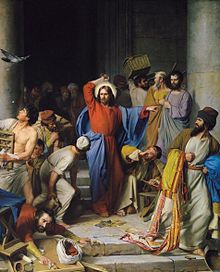Money changer

A money changer is a person or organization whose business is the exchange of coins or currency of one country for that of another.[1] This trade was a predecessor of modern banking.[2]
The advent of
bureaux de change and other similar financial entities to easily change one country's money for another, and with the added confidence of transparency
.
History


In ancient times in
Jewish Holy Days would change some of their money from the standard Greek and Roman currency for Jewish and Tyrian money, the latter two the only currencies accepted as payments inside the Temple.[3][4]
With this Temple money the pilgrim would purchase a sacrificial animal, usually a pigeon or a lamb, in preparation for the following day's events.
During the
merchants, visited towns for a market fair, it became necessary to exchange foreign coins to local ones at local money changers. Money changers would assess a foreign coin for its type, wear and tear, and validity, then accept it as deposit, recording its value in local currency. The merchant could then withdraw the money in local currency to conduct trade or, more likely, keep it deposited: the money changer would act as a clearing facility
.
As the size and operations of money changers grew they began to provide a lending facility, by adding the lending-fee to the foreign exchange rates. Later the Knights Templar provided this service to pilgrims traveling to and from the Holy Land.[5][6]
See also
Traveler's cheques
are given a lower value than regular banknotes.References
Wikimedia Commons has media related to Money changers.
Wikivoyage has a travel guide for Money & currency exchange.
- ^ "money changer". Merriam-Webster. Archived from the original on 2017-12-23. Retrieved 2016-03-19.
- ISBN 978-1-4437-2609-2.
- ^ Sanders, E. P. The historical figure of Jesus. Penguin, 1993.
- ISBN 0-06-117393-2
- ISBN 1-56025-645-1.
- ISBN 0-7509-2517-5.
